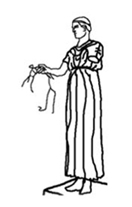
Design about
the
Charrioteer of
Delphi, around 470 B.C., bronze, height 180cm
The authors of archaeological literature about the Charioteer of Delphi think to recognize the brief moment before the start when an athlete aims his collected winning will to the goal. But some also say that it is the moment after victory.
Actually it does not matter if before or after - a carriage driver like that has done many races if he only could keep himself out of the deadly dangerous crashes at the changing points of the racing track.
The probably most beautiful ment of the figure is the hand which strongly holds the bridles. Stretched-out thumb and relaxed bent fingers in which the bridles swing almost carelessly.
The hand anyways is an essential aspect of the fascination of driving metaphors: der Mensch denkt, Gott lenkt (humans think god guides), or die Finger im Spiel haben (to have one's hand in it), or die Hand drauf haben (to have one's hand on it) and so on - anyways it is about freehandedness because who has hands bound can speak alot without steering. Everyone is responsible for one's own happiness, this commonplace in a droll way tells about the dependency between.*
The generell opinion about the Charioteer of Delphi is that he expresses the will for victory - this sounds great! On Schopenhauer's gravel road this sounds more prosaic - he says: "Der Mensch kann zwar tun, was er will, aber er kann nicht wollen, was er will." (man can do what he wants but he cannot want for what he wants).
However this may be, one cannot say if he has won once already, if he will win or if he is under drugs, has special rims like Ben Hur, or will fall by intrigues. He does not drive, he possibly starts soon....
*Everyone is responsible for one's own happiness ("jeder ist seines Glueckes Schmied"), this commonplace tells in a droll way about the dependency of the palpable and the brilliant understood (please note: the German terms "Handgreiflichkeit" - 'the palpable' - and "Begriffenhaben" - 'the having understood' - are etymologically and literally closely linked to 'Hand'/'hand'. The phrase 'everyone is responsible for one's own happiness' in German contains the term "Schmied" = smith - THE handyworker per se.)